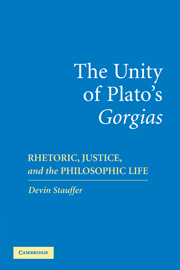Book contents
4 - Socrates' Situation and the Rehabilitation of Rhetoric
Published online by Cambridge University Press: 30 July 2009
Summary
The Gorgias reveals much about Callicles. It gives us a view into the soul of a young man who Socrates thinks could never truly join him in his search for the truth, and who is willing to be an outspoken critic of the philosophic life. It would seem fitting that the dialogue should also reveal much about Socrates, that we should see a presentation or defense of Socrates' philosophic life in response to Callicles' attack on it. And Socrates does return, on the heels of his critique of hedonism, to the question that he earlier let fade into the background. He reminds Callicles that the most important question at issue in their conversation is the most important of all human questions – “How ought one to live?” – and he returns to Callicles' exhortation of him to abandon philosophy and to turn to a more political life (500c1–8). Yet, although Socrates returns to the question of whether his life is truly choiceworthy, he seems to raise this question only to let it fade again into the background. It takes quite some time in the remainder of the dialogue before Socrates speaks directly about his own life; and when he does, his statements are quite brief (see 521a2–522e6; cf. 508c4–513c3). Also dampening our expectations that Socrates will be particularly open about his own life in the last part of the dialogue is his return, in the same section that immediately follows his critique of Callicles' hedonism, to the issue of rhetoric.
- Type
- Chapter
- Information
- The Unity of Plato's 'Gorgias'Rhetoric, Justice, and the Philosophic Life, pp. 123 - 176Publisher: Cambridge University PressPrint publication year: 2006

